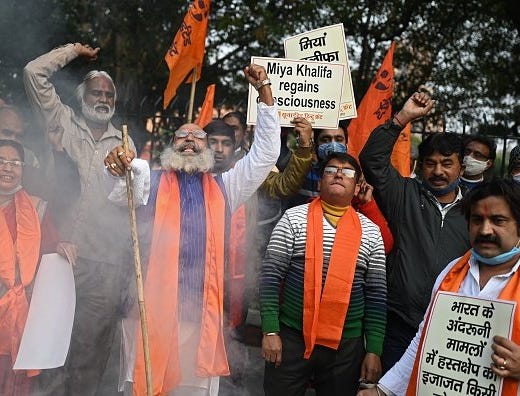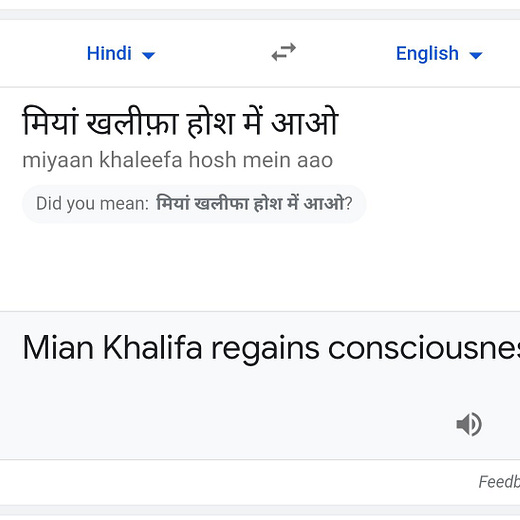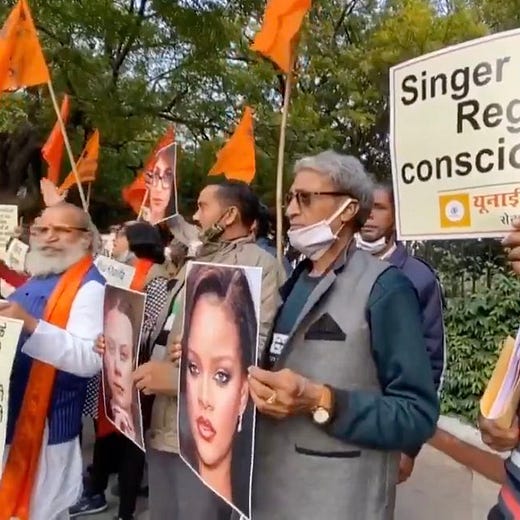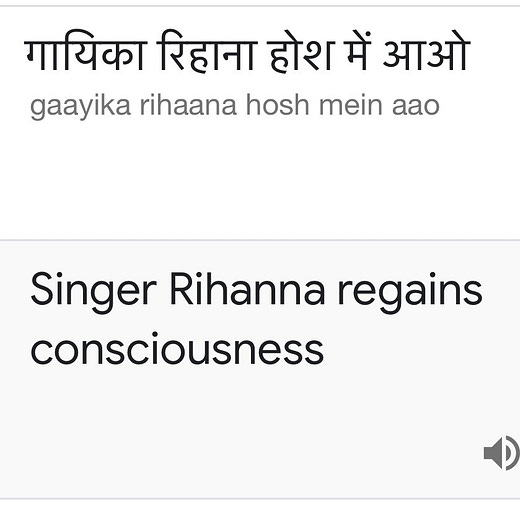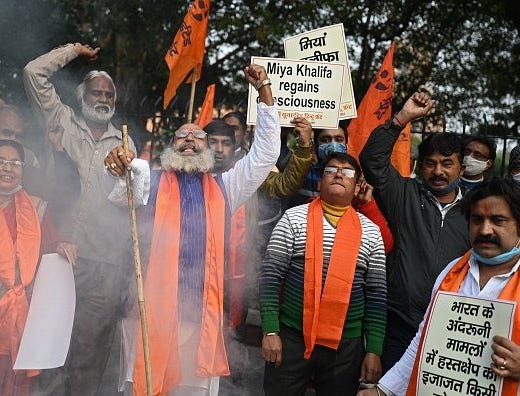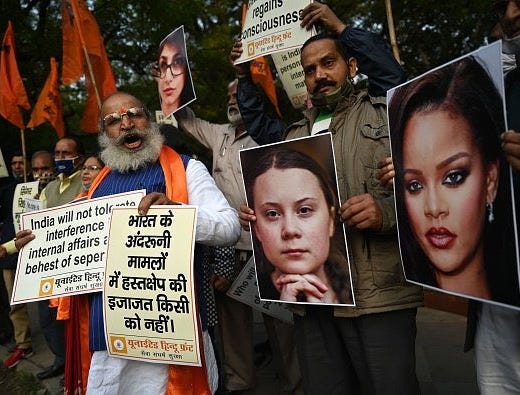The India Cable: Parliament Rocked by Farm Issue; Gandhi-mukt Chauri Chaura Centenary
Plus: Economist accuses Modi of anticipatory censorship, talk of herd immunity premature, DN Jha dead, over 7,000 Indians in foreign jails, and Google Translate embarrasses United Hindu Front
From the founding editors of The Wire—MK Venu, Siddharth Varadarajan and Sidharth Bhatia—and journalists-writers Seema Chishti, Sushant Singh and Tanweer Alam. Editor: Pratik Kanjilal
Snapshot of the day
February 5, 2021
Pratik Kanjilal
What began with a celebrity tweet has simultaneously taken serious and ridiculous turns within 24 hours. First, the ridiculous ― the Delhi Police have filed an FIR against climate activist Greta Thunberg for an “international conspiracy” to “defame India”, without naming her explicitly. The focus is the ‘toolkit’ she put online for the farmers’ movement, via a French shared editing site. It is no more than a communications strategy guide of the sort that NGOs and activists distribute to their staff routinely. What next, a red-corner notice for telling someone how to compose a tweet effectively? For now, there will be a probe into the “international conspiracy”, which would naturally be politically advantageous at home.
But seriously, the Biden administration has urged the government to resume talks with the farmers and resolve issues through dialogue. It’s the sort of message that the US diplomatic establishment routinely shoots off to Yemen and Myanmar, but never to Delhi. And though the missive promises generic support for market reforms and privatisation, it doesn’t look like the beginning of a beautiful friendship.
As the number of global celebrities and politicians showing solidarity with farmers protesting against three key legislations continued to grow, several Indian American civil rights organizations and activists have criticized the response of the Indian government.
Reiterating the same bad news every other day really tuckers us out, but yet again, we must report that fuel prices are at an all-time high ― petrol is at Rs 86.65 per litre in Delhi and Rs 93.20 in Mumbai. The last hike was about a week ago, and oil companies have said that only a tax cut by the government can rationalise prices. Since the financially troubled government is unlikely to do that, we should be seeing another all-time high in days.
Stand-up comedian Munawar Faruqui, who was arrested by the Madhya Pradesh police, on the complaint of the son of a BJP legislator for a joke that he did not crack, has been granted interim bail by the Supreme Court. He was arrested on January 2, allegedly for hurting religious sentiments, and was denied bail three times earlier.
And historian DN Jha, author of The Myth of the Holy Cow (hard copy here), who debunked the narrative of the Islamic destruction of Nalanda and the golden age that apparently preceded Muslim rule, has died. In 2014, he was attacked by Arun Shourie in the opinion pages of the Indian Express, which the former disinvestment minister had edited long, long ago in a world far, far away. Shourie, who is not a historian by training or ability, was out of his depth. In his last online appearance three weeks ago, Jha spoke on the destruction of Buddhist establishments in ancient India.
Highways and Parliament blocked by farmers’ issue
The Delhi Police prevented a group of 15 MPs from 10 Opposition parties from meeting agitating farmers at the Ghazipur border, even as the stalemate over the demand for a separate discussion on agricultural reforms continued in the Lok Sabha. While the government wants it to be taken up as part of the discussion on the Motion of Thanks on the President’s address, Opposition parties have been demanding a separate discussion on the farmers’ issue. Prime Minister Modi was scheduled to reply to the debate on the Motion of Thanks on Friday, but an aggressive Opposition has put paid to that.
Thirteen Opposition MPs, including from the DMK, CPI(M), CPI, Congress, RJD, SP and AAP, wrote to Home Minister Amit Shah urging the government to withdraw actions taken against farmers and restore power and water supply at protest sites. MPs also wrote to the Lok Sabha Speaker, saying that the Ghazipur border of Delhi had become like the India-Pakistan border, and that the condition of farmers resembles that of prisoners in jail. An MP of Sharad Yadav’s Loktantrik Janata Dal likened the Delhi border to Tiananmen Square, and said that the President “can see how democracy is butchered just a few kilometres away from the Rashtrapati Bhavan.” The Lok Sabha stands adjourned until 4 pm today.
The Shamli district administration in Uttar Pradesh has denied permission for a proposed farmers’ Mahapanchayat at Bhainswal village today. The organisers, including the Rashtriya Lok Dal and Samajwadi Party, insisted that they would go ahead with the congregation, featuring RLD vice-president Jayant Chaudhary as chief guest, even without permission.
As a counter to the Modi government’s strategy of tiring out the farmers, Bharatiya Kisan Union national spokesperson Rakesh Tikait has evolved a formula to keep the movement going: every village is to commit one tractor and 15 people for 10 days, in rotation. This would enable large numbers of farmers to participate in the movement while the community remains engaged in farming.
Only 21.5% have been exposed to novel coronavirus
The third national serosurvey, conducted from December 17 to January 8, has found that 21.5% of the population showed evidence of past exposure to the coronavirus. It means that a large population still remains vulnerable, herd immunity cannot be relied upon and mass vaccination is crucially necessary. Urban slums have reported the highest seroprevalence, 31.7%. The last serosurvey, conducted in August 2020, had found that nearly 7% of India’s population aged ten and above was exposed to the coronavirus.
The Union Health Ministry has said that it would make the adverse event investigation reports on 19 post-coronavirus vaccination deaths public after a national-level panel of experts reviewed all the reports received from the states.
Gandhi-mukt Chauri Chaura centenary
Prime Minister Modi did not mention the name of Mahatma Gandhi even once at the event to commemorate the turning point of the nationalist movement, when he found Indians morally unprepared for the great task at hand. As former Vajpayee aide Sudheendra Kulkarni writes, there was “not one word about the context: Non-Cooperation Movement, in which Hindus and Muslims fought unitedly against the British rule. Complete silence on Gandhiji’s decision to halt the movement because it had turned violent. And total suppression of that ‘dangerous’ word – Ahimsa.”He adds that the PM spoke more about the budget and his masterful handling of the pandemic. Yogi Adityanath followed his lead, suggesting that the project was to manipulate history and appropriate Chauri Chaura into a new political narrative.
No hissing and spitting, please, this is the MEA
While the US State Department urged the Indian government to resolve its differences with the farmers over agriculture laws through dialogue, saying that peaceful protests and unhindered access to the internet are a “hallmark of any thriving democracy”, the Foreign Ministry chose to deflect attention by comparing the violence during the farmers’ tractor parade on January 26 with the storming of Capitol Hill. It also said, “The temporary measures with regard to internet access in certain parts of the NCR region were therefore understandably undertaken to prevent further violence.” It’s a measured counterpoint to the anger, sanctimonious outrage and coordinated tweets from assorted celebrities and ministers, which were on full display against Rihanna and other international celebrities when they questioned the internet ban at protest sites.
Modi’s anticipatory censorship
The Economist on how the Modi government is censoring people before they comment ― including turning off the internet in areas where protests might be organised:
“Idi Amin, the late Ugandan dictator, once declared that he respected freedom of speech, but could not guarantee freedom after speech. India’s government seems to be taking this concept one step further. Despite running what is often hailed as the world’s biggest democracy, it has gained a taste for curtailing freedom before speech.”
Book Excerpt
The making of an activist lawyer
Sudha Bharadwaj
In 1982, Shankar Guha Niyogi was arrested under the National Security Act, and there was an agitation by the Delhi Textile Workers in his support. We went and saw that. The first time I went to Dalli Rajhara (then in Madhya Pradesh, now in Chhattisgarh) to Niyogiji’s trade union was in 1983, and it was a remarkable experience. He used to say that it is not an eight-hour trade union; it is a 24-hour trade union. It dealt with all aspects of people’s lives.
The trade union had 17 departments ― health, education, women’s issues, and so on. Some were very successful, like the Shaheed Hospital. The Health Department had developed into a huge hospital. They were running 11 schools and this concept of the red-and-green flag, [representing] the worker-peasant alliance ― that union office was so vibrant. The union had organised peasantry from all around. That is how Dalli Rajhara had become symbolic of a workers’ power centre. That is why the Bhilai workers went there, and in 1990, the movement started in Bhilai.
We started going in 1983 and by 1986, I had made up my mind to go and work there. I remember my mother being very worried and saying that for a woman, it is very difficult. “You don’t have an identity. Why are you quitting your studies and going?” But I was very convinced. I said, “Whatever they want me to do, I’ll do.” Maybe she would have been happy now, to see me as a lawyer. Maybe she would have thought, okay, you are more useful like this. But actually, it is the workers who taught me. All that experience of the trade union has been very, very important to lawyering.
I remember, after Niyogiji’s assassination, Justice Krishna Iyer had delivered the first Niyogi Memorial lecture. He began by saying, “Niyogi tried to bring the Constitution to life for the Adivasi miners of Chhattisgarh.” We have to bring the Constitution to life. That’s where the lawyers and peoples’ organisations have to work together. I am lucky, I have come from there. So it’s natural for me…
Could you tell us how you became a lawyer and how you got into cause lawyering?
Well, I had no idea that I would become a lawyer. I basically joined a trade union, the Chhattisgarh Mukti Morcha led by Shankar Guha Niyogi, the legendary trade unionist. I came in about the year 1986 to join the union, and in fact, originally I had come with the idea of helping in the schools, in which the union was working. But gradually, I got drawn into the organising of the movement itself, particularly when it shifted to Bhilai in the 1990s. After that, Niyogiji was assassinated in 1991, and there was police firing in 1992. And after that, from the 1990s onwards, there was a huge movement of the contract labour in Bhilai.
I practically became a representative of all the workers. And then came the experience of … how difficult it was to get lawyers who would represent them honestly! It was actually the workers who told me that you have to run behind the lawyers and you have to pay them fees which you can’t afford. It was a contract labour union, a very poor union, and on top of that, we found that the lawyers were not doing the job properly. Many times, we found that they were being retained by the other side, and so on. So they (the workers) were the ones who persuaded me to become a lawyer.
That was around the time that I also adopted my daughter. So, while I was at home, I decided to do a law course and I can tell you that I did not attend more than one lecture (laughs), basically just going and giving exams. In terms of studying law, I just passed. But the real study of law came afterwards. In the year 2000, I became a lawyer at the ripe old age of 40. So, basically I became a lawyer, out of necessity, and started doing the cases of the contract labourers.
Then I realised that actually, all people’s movements faced the same problems as our union faced, which was that the implementation of the laws that give people rights was very poor. They need to struggle, and struggle, and struggle for it. On the other hand, when they agitate, a lot of cases are put on them, criminal cases are put on them, and they have to defend themselves.
Actually, they don’t find lawyers who understand their viewpoint, who will also not fleece them, and won’t be too formal, and can also understand the exigencies of the movement. Above all, the fact is that the legal strategy has to intertwine with the strategy of the movement. So, I think, that is something that I found was a more general thing, and that is how, slowly, we came to form this group called Janhit, based in Bilaspur, which is the seat of the state High Court. Now we handle many, many, cases of villagers who are protesting against illegal acquisitions, of people who are protesting environmental public hearings, some human rights cases, cases of forest rights, and of course labour matters and public interest litigations. So that is our, kind of, forte…
Excerpted from Sudha Bharadwaj Speaks: A Life in Law and Activism. Interview conducted in 2012 by Shantanu Chakraborty and Darshana Mitra. Footnotes and annotations (not reproduced here) compiled by Atindriyo Chakrabarty and Shalini Gera.Edited by Arvind Narrain. Published by PUCL. 316 pages, unpriced. Download the full text.
Reportedly
“The right thing should be done. The most correct thing should be done. The most noble thing should be done.” That is the response from Bollywood superstar Salman Khan, when he was asked about the farmers who have been protesting against the Centre’s new farm laws. He didn’t copy-paste the government-supplied text on Twitter. But we don’t really know what he said either.
Prime Number: 7,139The number of Indian prisoners, including undertrials, lodged in jails around the world. Saudi Arabia has the highest number at 1,599 Indian prisoners, followed by the United Arab Emirates with 898 and Nepal, with 886 Indians in its prisons.Ceasefire violations doubled
Cases of ceasefire violations by Pakistan on the Line of Control have more than doubled in the past three years (from 2,140 in 2018 to 5,133 in 2020), particularly after the abrogation of special provisions under Article 370 for Jammu & Kashmir. But there is a decline in the number of casualties (both civilian and security personnel) in exchanges of fire.
Deep Dive
Income inequality matters
The latest Economic Survey (2020-21) makes a controversial assertion: “Unlike in advanced economies, in India economic growth and inequality converge in terms of their effects on socio-economic indicators.” Instead of looking at adverse effects of income inequality on socio-economic indicators and even growth, income inequality has been held to be beneficial! This thread explains why this is not the case at all.
In Digital India, students fell off the map
India’s budget has cut back on education spends this year and schools took the biggest hit, with cutbacks of Rs 6,000 crore. This is particularly alarming, given the challenge the pandemic threw at education last year. It transpires that 1.66 lakh students in Delhi fell off the grid as schools moved online. The data, culled from the education department of Delhi and civic bodies that run the municipal schools, shows that these children have simply fallen off the map ― the schools say they can’t trace them. Delhi is India’s most favoured ― even pampered ― city. Elsewhere, the situation could be worse.
Nine high courts still virtual
Only 16 out of 25 high courts have resumed physical hearings, which had ceased during the coronavirus-induced lockdown, the government informed the Rajya Sabha. Nine high courts are hearing matters virtually. As is the Supreme Court.
Op-Eds you don’t want to miss
If the Sikh community continues to be branded as Khalistani by the neo-nationalists and a section of the media with the perceived support of the ruling dispensation, the consequences for national security would be horrendous, warns Lt Gen HS Panag (retd).
If one takes stock of the tactics the government has used so far, they would constitute a brutal guidebook for any regime to cynically suppress not just the agitating sections but the very idea of the citizen, writes Suhas Palshikar.
P. Sainath writes on Rich Farmers, Global Plots and Local Stupidity.
Mukul Kesavan calls out the farce of Indian nationalism under the Modi government, and the manner in which “many captains, former and current, stepped up to man the breach in India's unity opened up by predatory anarchists like Rihanna and Greta Thunberg.”
Sidharth Bhatia (a contributor to The India Cable) on the limits of Hindutva’s homegrown authoritarianism, and why the Hindutva mind is out of sync with the modern world.
“We put men in charge with hearts of molten concrete and souls full of spikes, they are casting us in their own likeness, we have become a realm of timid ferocities, we bark at our own,” writes Sankarshan Thakur.
The government, obsessed with applying sedition charges on anyone opposed to their views, reminds Julio Rebeiro of the Great Khali and his tribesmen in the world of freestyle wrestlers, with a long list of opponents.
The response to tweets by Rihanna and Greta Thunberg reveals a deep national insecurity and anxiety about India’s place in the world, writes Rohit Chopra.
India is big and diverse, and states must be allied to legislate on agriculture and the marketing of produce, which are in the state list under the Constitution, writes BR Bajaj.
“In this age, when distances have been obliterated, no nation can afford to imitate the frog in the well. Sometimes, it is refreshing to see ourselves as others see us,” Ramachandra Guha quotes Mahatma Gandhi from 1938 on the Modi government’s response to Rihanna.
The Hindu editorial calls India’s attitude to handling criticisms “pious and sanctimonious”.The Indian Express yesterday did some tough talking and said it made “India look prickly and insecure.”
Listen up
Born into violence, poverty and the desolation of colonial exploitation, newly independent India was a nation working hard to find its footing. But its head was held sky-high. The story of India’s space programme for the last seven decades is such an unlikely one, with so many uncommon characters, filled with such impossible odds, that it can sometimes seem like science fiction rather than science. ‘Mission ISRO with Harsha Bhogle’ tells the story.
Watch Out
Janam aur Jeevan, a short film about the hardships of pregnancy in rural India and women’s right to maternity entitlements, has been released, and the timing makes it a response to cuts in budget allocations for maternity entitlements and ICDS.
Tailend
Higher consciousness via Google Translate
The world watched in bemused disgust as obscure Hindu front organisations were trotted out to burn posters of Meena Harris and Greta Thunberg. But if you understand Hindi, the slogans on posters carried by the so-called United Hindu Front, hot off Google Translate, will delight the senses.
The former adult cinema actress, whose first name is ‘Mia’ and not ‘Miya’ (casual Hindi for a Muslim) has also reacted to this placard:
That’s it for today. We’ll be back with you on Monday, on a device near you. If The India Cable was forwarded to you by a friend (perhaps a common friend!) book your own copy by SUBSCRIBING HERE.




